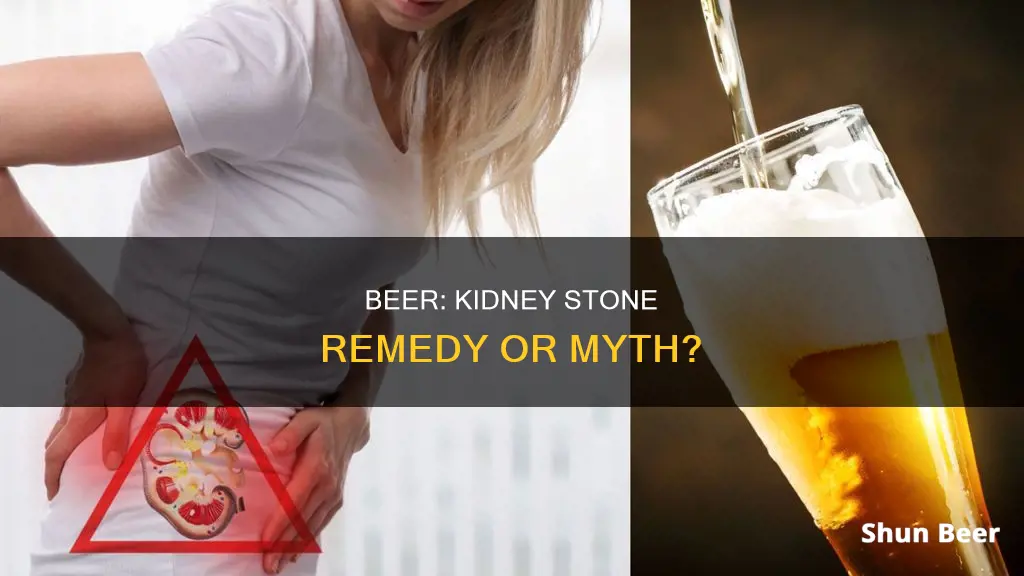
Drinking beer to flush out kidney stones is a common misconception. While beer is a diuretic, it can only help flush out small kidney stones stuck in the urethra and too, in an emergency. Beer can cause calcium oxalate crystals to form, increasing the likelihood of kidney stones. The only way to help the body remove kidney stones is to stay hydrated by drinking at least 1.5 litres of water daily.
| Characteristics | Values |
|---|---|
| Can drinking beer flush out kidney stones? | No, it is a misconception. Beer can cause calcium oxalate crystals to form, increasing the possibility of kidney stones. |
| What causes kidney stones? | Kidney stones are formed when certain substances, such as calcium, oxalate, and uric acid, become concentrated enough to form crystals in the kidneys. |
| How to prevent kidney stones? | Drinking enough water, eating more calcium-rich plant foods, consuming citric acid, reducing sodium intake, and cutting back on animal protein. |
What You'll Learn
- Drinking beer is a misconception for flushing out kidney stones
- Beer can cause calcium oxalate crystals to form, increasing the possibility of kidney stones
- Beer is a diuretic and can help flush small kidney stones stuck in the urethra
- The only way to help the body remove kidney stones is hydration
- Drinking 2 litres of water daily can help prevent kidney stones

Drinking beer is a misconception for flushing out kidney stones
Drinking beer to flush out kidney stones is a misconception. Beer can cause the formation of calcium oxalate crystals, increasing the likelihood of kidney stones. While beer is a diuretic, it is only effective in flushing out small kidney stones stuck in the urethra and should be used in emergencies only.
The best way to prevent kidney stones is to stay hydrated by drinking at least 1.5 litres of water daily. This helps the body remove kidney stones and prevents their formation.
Males are more prone to developing kidney stones than females, with adolescents and adult males being the most common patients. People who perspire excessively, drink little or no water, delay urination, and overeat are also at a higher risk of kidney stone formation.
Kidney stones are hard deposits of calcium, oxalate, and phosphorous that form in the kidneys. They can cause severe pain, including flank pain, nausea, vomiting, and blood in the urine. While some stones pass out of the body quickly, others can take several weeks or months to pass, depending on their size and number.
If the kidney stones become too large or cause unbearable pain, a procedure called a ureteroscopy may be necessary. This involves passing a small endoscope into the bladder and breaking up the stones with a laser before removing the fragments.
To summarise, drinking beer is not an effective way to flush out kidney stones. It can even contribute to their formation. The key to preventing kidney stones is staying properly hydrated by drinking enough water daily.
Beer and Loratadine: Safe Mix or Health Risk?
You may want to see also

Beer can cause calcium oxalate crystals to form, increasing the possibility of kidney stones
Kidney stones are hard masses of minerals and salts that form in the kidneys. They are often painful and can cause complications such as urinary tract infections. The most common type of kidney stone is the calcium oxalate stone, which forms when there are high levels of oxalate in the urine. Oxalate is a substance found in many foods, including green, leafy vegetables, spinach, French fries, baked potatoes, strawberries, and raspberries. When consumed, oxalate is broken down and absorbed by the body, with the leftover wastes removed through urine.
Beer is a diuretic, which means it increases urine production. However, according to Tainan-based urologist Su Chia-chen, it is a misconception that drinking beer can help flush out kidney stones. While beer may help flush out small kidney stones stuck in the urethra in an emergency, it is not a recommended treatment method. This is because beer can cause calcium oxalate crystals to form, increasing the possibility of kidney stones.
To prevent the formation of kidney stones, it is crucial to stay hydrated by consuming adequate fluids, especially water. A daily intake of at least 1.5 liters of water is recommended to maintain proper hydration and reduce the risk of kidney stone formation.
Beer Before a Urine Test: What You Should Know
You may want to see also

Beer is a diuretic and can help flush small kidney stones stuck in the urethra
While the idea that drinking beer can help flush out kidney stones is a misconception, beer is a diuretic and can be used in an emergency to help flush out small kidney stones stuck in the urethra. However, it is important to note that beer can cause calcium oxalate crystals to form, increasing the possibility of kidney stones. Therefore, it is not a recommended alternative to actual medical treatment.
The only effective way to help the body remove kidney stones is to stay hydrated by drinking enough water. According to experts, a daily intake of at least 1.5 liters of water is necessary to prevent the formation of kidney stones. Additionally, it is worth mentioning that males have a higher chance of developing kidney stones than females, and people prone to excessive perspiration are also at a higher risk.
Kidney stones are hard, pebble-like deposits that form in the kidneys when certain substances, such as calcium, oxalate, and uric acid, become concentrated enough to create crystals. These crystals then grow into larger "stones." The stones can dislodge and pass down the ureter, which is the tube connecting the kidneys to the bladder, causing severe pain, nausea, and sometimes blood in the urine. As the stones move towards the bladder, they may cause frequent urination, bladder pressure, or pain in the groin.
If you experience any symptoms of kidney stones, it is important to consult a doctor. They may perform a urinalysis and order additional tests, such as a renal ultrasound or CT scan, to confirm the presence of kidney stones. While small stones may pass on their own, larger stones may require a procedure called a ureteroscopy to break up and remove them.
Beer Drinking in Public: North Carolina's Law
You may want to see also

The only way to help the body remove kidney stones is hydration
Drinking beer will not help flush out kidney stones. In fact, beer can cause calcium oxalate crystals to form, increasing the possibility of kidney stones. Beer is a diuretic, so it could help flush out small kidney stones stuck in the urethra, but only in an emergency. The only way to help the body remove kidney stones is hydration.
Drinking enough water is one of the best ways to prevent kidney stones. The National Kidney Foundation recommends producing 2 to 2.5 liters of urine daily, which can be achieved by drinking about 2 liters of water. This will make a person 50% less likely to develop kidney stones.
Kidney stones are hard deposits of material that form in the kidneys. They are typically caused by high levels of calcium, oxalate, and phosphorous in urine. About 80% to 85% of kidney stones are made of calcium, while the rest are uric acid stones, which form in people with low urine pH levels.
Kidney stones can cause severe pain, including flank pain, nausea, vomiting, and blood in the urine. They may also lead to frequent urination, bladder pressure, or pain in the groin. If you experience any of these symptoms, it is important to see a doctor.
While kidney stones can be extremely painful, there are simple ways to help prevent them, such as staying hydrated, eating more calcium-rich plant foods, consuming lemons, reducing sodium intake, and cutting back on animal protein.
Beer Coolers: Understanding the Science of Cold
You may want to see also

Drinking 2 litres of water daily can help prevent kidney stones
Drinking beer to flush out kidney stones is a misconception. Beer can cause calcium oxalate crystals to form, increasing the possibility of kidney stones. While beer is a diuretic, it is only helpful in emergencies when small kidney stones get stuck in the urethra. The only way to help the body remove kidney stones is through hydration.
Firstly, it's important to understand that kidney stones are hard mineral deposits that form inside the kidneys. They cause excruciating pain when they pass through the urinary tract. Up to 12% of Americans are affected by kidney stones, and this number is rising. If you've had one kidney stone, you're 50% more likely to experience another within the next decade. Therefore, it's crucial to take preventive measures.
Drinking water is one of the best ways to prevent kidney stones. When you don't drink enough water, your urine output decreases, leading to more concentrated urine that is less likely to dissolve the urine salts that cause stones. By drinking an adequate amount of water, you increase your urine output, diluting the concentration of minerals in your urine and reducing the chance of stone formation.
The recommended daily water intake varies from person to person, but generally, it's advised to drink enough water to pass around 2 litres of urine per day. This may require drinking more than 2 litres of water since water is also used for other bodily processes like digestion, and some is lost through sweat.
To ensure you're adequately hydrated, check the colour of your urine. It should be clear or pale yellow. If it's dark, it's a sign that you need to drink more water.
In addition to staying hydrated, there are other measures you can take to prevent kidney stones. These include:
- Eating more calcium-rich foods: Contrary to what some believe, a low-calcium diet may increase your risk of kidney stones and osteoporosis. However, be cautious with calcium supplements as they may have the opposite effect. Instead, opt for low-fat milk, low-fat cheese, and low-fat yoghurt.
- Reducing sodium intake: A high-salt diet increases your risk of calcium kidney stones by preventing the reabsorption of calcium from urine into the blood. This leads to high urine calcium levels, which can result in kidney stones. Reading food labels carefully and opting for fresh herbs or salt-free seasonings can help reduce sodium intake.
- Limiting oxalate-rich foods: Oxalate is a natural compound that binds with calcium in the urine to form kidney stones. While it's not necessary to cut out oxalate-rich foods completely, it's beneficial to limit your intake of foods like peanuts, rhubarb, spinach, beets, chocolate, and sweet potatoes. Additionally, try to eat calcium-rich and oxalate-rich foods together during a meal to encourage binding in the stomach and intestines before the kidneys are involved.
- Reducing animal protein consumption: Animal protein is acidic and can increase urine acid levels, contributing to the formation of uric acid and calcium oxalate kidney stones.
- Avoiding vitamin C supplements: High doses of vitamin C supplements have been linked to an increased risk of kidney stone formation, especially in men. However, vitamin C from food sources does not appear to carry the same risk.
By combining adequate hydration with these dietary changes, you can significantly reduce your risk of developing kidney stones.
California Minors and Non-Alcoholic Beer: What's the Law?
You may want to see also
Frequently asked questions
No, this is a misconception. Beer can cause calcium oxalate crystals to form, increasing the possibility of kidney stones. While beer is a diuretic, it should only be used in emergencies to flush out small kidney stones stuck in the urethra.
The best way to prevent kidney stones is to stay hydrated by drinking at least 1.5 to 2 litres of water per day.
In addition to staying hydrated, eating more calcium-rich plant foods, consuming lemons, reducing sodium intake, and cutting back on animal protein can help prevent kidney stones.







